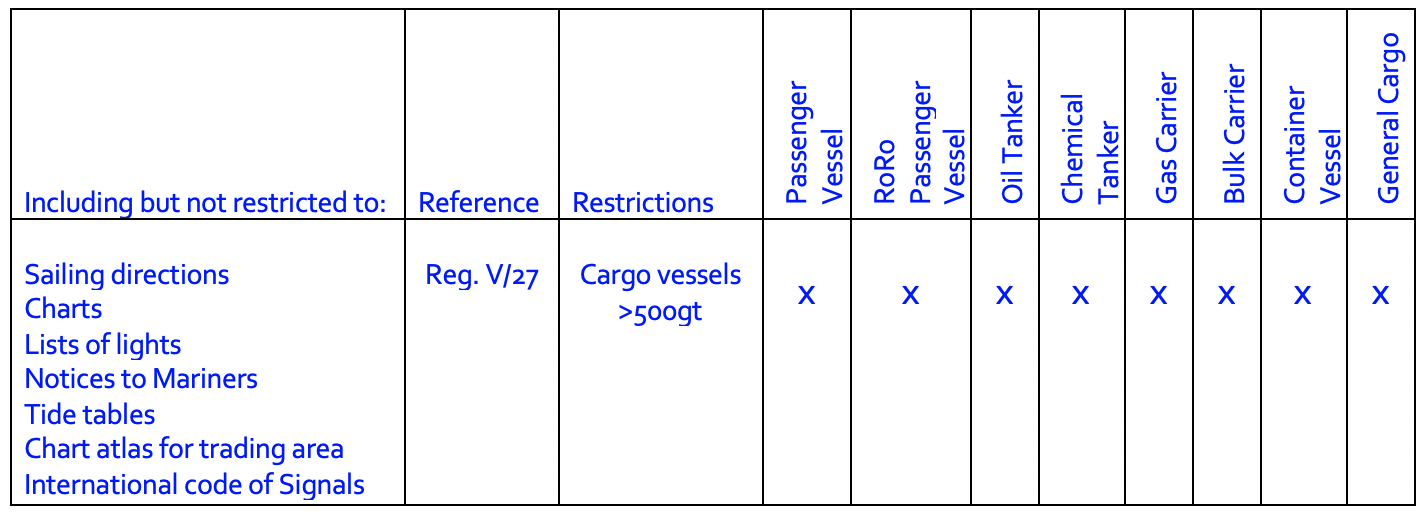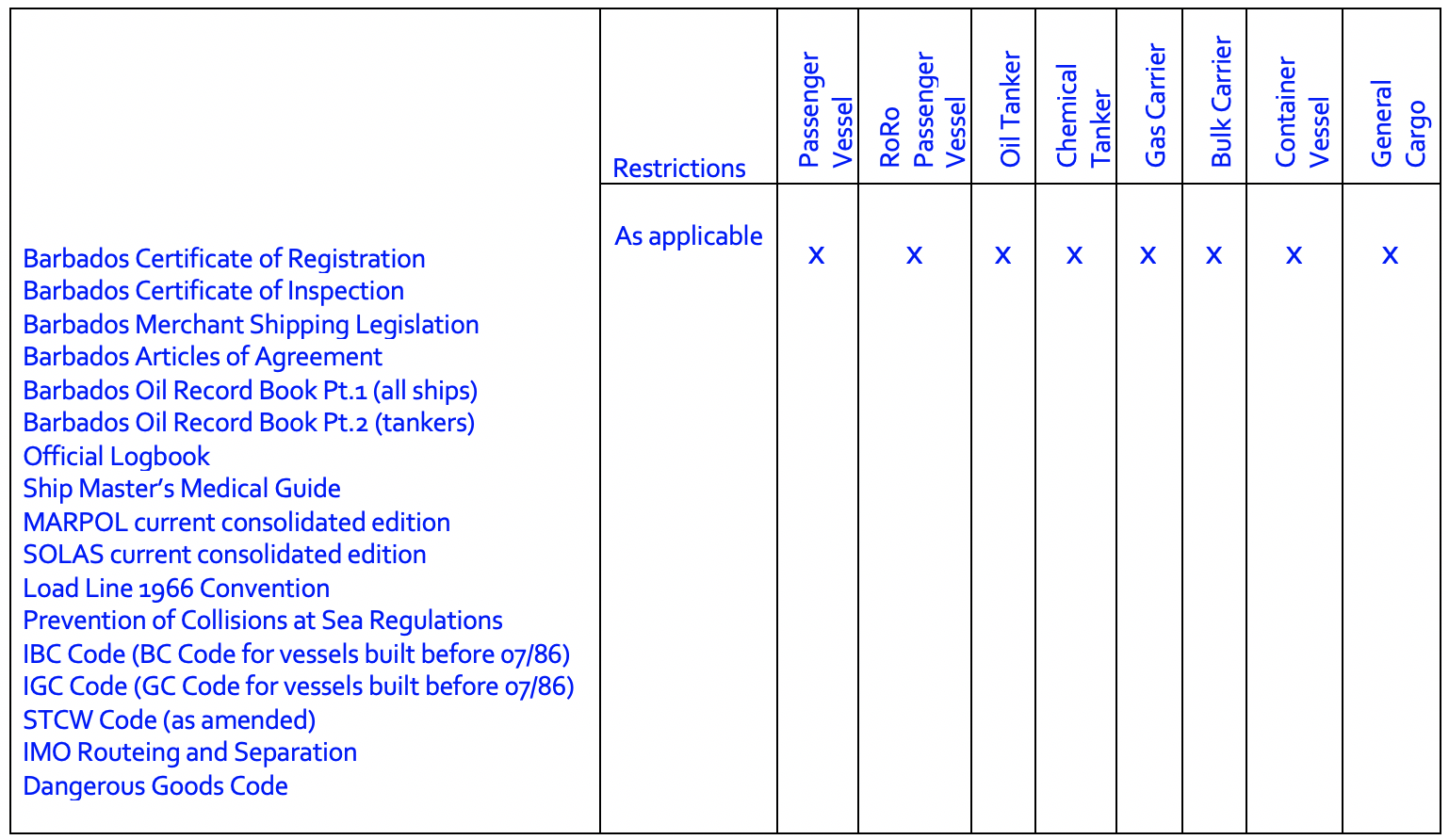PORT STATE CONTROL INSPECTION MANAGEMENT
Guidance and Instructions for Barbados Recognised Organisations, Barbados Approved Nautical Inspectors, Ship Owners, Managers and Masters
1. Purpose
1.1. This Bulletin is intended to give guidance on the management of Port State Control (PSC) Inspections.
2. Application
2.1 This Bulletin is applicable to all Barbados ships subject to Port State Control Inspections.
3. The Barbados Ship Register and Port State Control
3.1 All Companies* operating ships will understand the importance and benefit of maintaining, and improving, the current low rate of Port State Control (PSC) detentions and the position of Barbados as a less targeted flag (white list) of the major regional PSC Memoranda of Understanding (MOUs).
3.2 The BMSR is fully supportive of the objectives of the PSC process in eliminating sub-standard shipping when applied in a fair and equitable manner. However, it is recognised that there are occasions when a detention may have been avoided or reconsidered with a better understanding of the process. The following comments have been prepared for the information of Companies and to give guidance on the management of the PSC inspection process.
4. Preparation for the PSC Inspection
4.1 A number of bodies, such as Classification Societies, P&I Clubs, etc, have produced checklists and guidance relating to preparation for PSC inspection. We also have a guide to PSC inspections in our Masters Guide, Companies may find these useful as an aid to ensuring that the vessel is routinely prepared for PSC inspections.
4.2 Companies are reminded that failures and breakdowns of equipment need not be a cause for detention provided that the Flag State and Recognised Organisation have been advised as soon as the breakdown is experienced, and the Port State has been alerted prior to arrival. Such reports may be the trigger for the PSC Officers (PSCOs) to attend on board and so the vessel must be prepared for this attendance.
4.3 Masters should recognise that PSCOs have an expectation that their attendance on board will be given full and prompt attention. It is important to establish a professional working relationship with the PSCO.
5. Understanding PSC Inspection
5.1 The BMSR has noted some inconsistencies in approach and interpretation between and within various Port States. It is important that senior officers on board are familiar with the PSC process to ensure that the inspection is carried out in a manner consistent with IMO Assembly Resolution A.1052(27), as amended –“Procedures for Port State Control”.
5.2 Resolution A.1052(27) is a publication available from IMO and a copy should be carried on board to assist in a professional participation in the PSC process. Companies are urged to ensure that their Safety Management System incorporates procedures to prepare for, and to deal with, PSC inspections and detentions to prevent confusion and unnecessary delay.
5.3 On conclusion of the inspection, the Master should, where appropriate, discuss the PSC report with the PSCO with regard to its justification and/or the timeframe given for rectification of deficiencies.
5.4 Deficiencies identified at PSC inspections should be closed out directly with the PSC authority involved. It should be noted that if a vessel has open deficiencies the targeting factor may be increased.
5.5 It should be noted that there is no formal appeal or review process for non-detainable deficiencies. Where a Company wishes to challenge a non-detainable deficiency, they should contact the PSC authority concerned requesting that the deficiency be reviewed. It the experience of the BMSR, such requests have limited success.
6. PSC and The International safety Management Code (ISM) and the MLC 2006
6.1 A detention and the majority of the PSC deficiencies may be considered as ISM related. There is now also a trend to use the MLC requirement for a safe place of work as a catch all. These linkages are often made by the attending PSCO, in particular when large numbers of deficiencies are found.
6.2 Proper implementation of the Safety Management System on board can be an effective tool to reduce deficiencies found at PSC and other inspections.
7. Reporting of PSC Inspections
7.1 In order to assist the BMSR in identifying those vessels which may be at increased risk of detention, the Company is required to send copies of every PSC inspection report (Form A and, if deficiencies are identified, Form B) to the BMSR as soon as possible after the inspection.
7.2 The BMSR will examine the PSC reports to determine if any further action is appropriate. This may include an additional ISM audit or BMSR inspection. The BMSR will contact the Company if any further action is deemed appropriate.
7.3 The Classification Society and/or Recognised Organisation issuing the affected certificates may have their own reporting requirements which the Company and Master should follow.
7.4 Persistent failure to provide PSC inspection reports may be regarded as objective evidence of a failure in the Safety Management System and lead to non-conformities being raised at external ISM audits.
8. Reporting of PSC detentions
8.1 The Company is required to inform the BMSR the RO, Classification Society and the ISM issuing body if a ship is detained. The BMSR should also be informed of actions taken or planned to rectify all deficiencies as soon as practicable.
8.2 The Company shall undertake a Root Cause Analysis (RCA) within 30 days of the date of detention and take corrective actions tro prevent a reoccurrence.
8.3 When the RCA is received, BMSR will review it and the ships history to determine what additional inspections of shipboard and or office Safety Management systems is required.
8.4 If a ship is detained twice within a 12 month period it will be deleted from the Register.
8.5 If a Company wishes to dispute a detention, they should inform BMSR and we shall try to assist as far as we can. The onus is on the Company to make the appeal against the detention, within the time-scale permitted by the MOU.
* The “Company” is the entity responsible for the management of the ship in accordance with the ISM Code. For ships to which the ISM Code is not applicable, the Company is the Managing Owner in accordance with the Shipping Act 1994.



